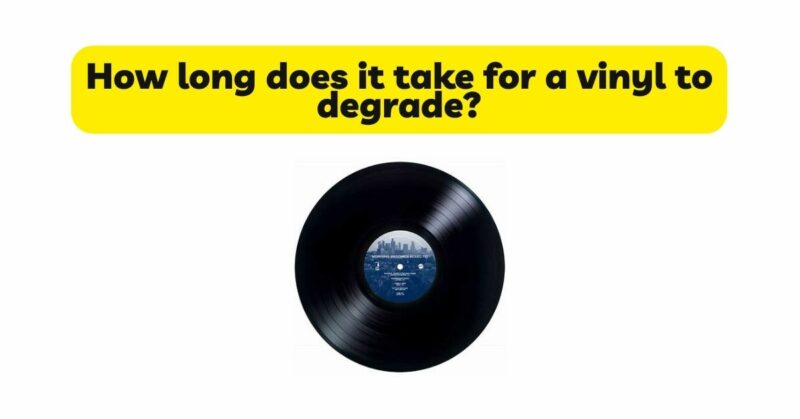Vinyl records have stood the test of time, captivating music enthusiasts with their distinctive sound and enduring appeal. However, one question that often arises is how long it takes for a vinyl record to degrade. In this article, we will explore the factors that contribute to the degradation of vinyl records, including environmental conditions, handling practices, and the lifespan of the vinyl material itself. By understanding these elements, we can gain insights into the longevity of vinyl records and how to preserve them for generations to come.
- The Lifespan of Vinyl: Vinyl, the material used to create records, is known for its durability and resilience. When properly cared for, vinyl records can last for decades or even longer. The vinyl material itself has a relatively long lifespan, thanks to its resistance to moisture, temperature fluctuations, and general wear and tear.
- Environmental Factors: Environmental conditions play a significant role in the degradation of vinyl records. Exposure to excessive heat, humidity, direct sunlight, and extreme temperature changes can have detrimental effects on vinyl. High temperatures can cause warping or softening of the vinyl, while humidity can promote mold growth or damage the grooves.
- Storage and Handling: Proper storage and handling practices are crucial for maintaining the longevity of vinyl records. Storing records in an upright position, away from direct sunlight and extreme temperatures, helps prevent warping and deterioration. Handling records with clean hands and avoiding touching the playing surface can minimize the transfer of oils, dirt, and debris that could damage the grooves.
- Groove Wear and Needles: Each time a vinyl record is played, the stylus or needle makes contact with the grooves, resulting in wear over time. However, modern stylus materials and advancements in cartridge design have significantly reduced the wear caused by playing records. Regularly cleaning the stylus and replacing it when worn can further minimize the potential for groove damage.
- Scratches and Physical Damage: Vinyl records are susceptible to scratches and physical damage, which can affect sound quality and longevity. Mishandling, improper storage, or using a worn-out stylus can increase the risk of scratches. It is important to handle records with care, store them in protective sleeves, and avoid placing heavy objects on top of them.
- Chemical Exposure: Exposure to certain chemicals can degrade vinyl records over time. Harsh cleaning solvents, improper storage materials, or exposure to pollutants in the environment can cause the vinyl to deteriorate or become discolored. Using gentle cleaning methods and storing records in archival-quality sleeves and storage containers can help protect them from chemical damage.
- Record Pressing Quality: The quality of the record pressing can also impact the longevity of vinyl records. Well-pressed records with clean, well-defined grooves tend to have a longer lifespan compared to records with manufacturing defects or poor quality control. Records pressed on high-quality vinyl and using high-fidelity mastering techniques are more likely to withstand the test of time.
- Preservation and Care: Preservation and care practices are essential for prolonging the life of vinyl records. Regular cleaning using gentle methods, storing records in a controlled environment, and handling them with care can help minimize degradation. Additionally, proper maintenance of playback equipment, including regular stylus replacement and careful tonearm setup, can contribute to the preservation of vinyl records.
Conclusion: Vinyl records, when properly cared for, can provide a lifetime of enjoyment. The longevity of vinyl depends on various factors, including environmental conditions, storage practices, handling, and the quality of the vinyl and pressing. By understanding the potential degradation risks and implementing proper preservation and care practices, we can ensure the longevity of vinyl records for future generations to cherish.While vinyl records are not immuneto degradation, they possess remarkable resilience and can withstand the test of time when handled and stored with care. By creating an optimal environment for storage, implementing gentle cleaning methods, and following proper handling practices, we can extend the lifespan of vinyl records and continue to enjoy their unique sound for years to come.So, if you are a vinyl enthusiast or a collector, invest time and effort in preserving and caring for your vinyl records. By doing so, you can ensure that the music you love remains accessible and enjoyable, preserving the magic and nostalgia that vinyl records bring to the world of music.


